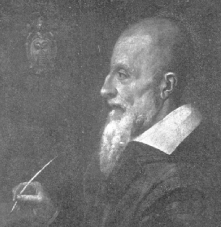A man who may have to share with Aristotle the palm "Greatest Scholar of All Time"

A man who may have to share with Aristotle the palm "Greatest Scholar of All Time"
In the preface to Harvard University Press's 1927 edition of Joseph Scaliger's autobiography, George W. Robinson opines that "whether Joseph Scaliger should be reckoned the greatest scholar of all time, or should share that palm with Aristotle, is, perhaps, an open question. Of his primacy among scholars of modern times there can be no doubt. 'Phoenix of Europe,' 'light of the world,' 'sea of sciences,' 'bottomless pit of erudition,' perpetual dictator of letters,' 'the greatest work and miracle of nature,' 'victor over time' -- to seek to limn the portrait of a man to whom such terms can be applied, without even a thought of incongruity, by the staidest of professors and the most learned of critics, is indeed a task to make even a stout heart hesitate."
Fortunately, however, not all stout hearts have hesitated. The following information is quoted from John Edwin Sandys' A History of Classical Scholarship, Volume II.
Joseph Justus Scaliger (1540-1609) was of Italian descent. At Agen on the Garonne, he was the constant companion of his father, Julius Caesar Scaliger, during the last four years of that father's life. Between the ages of fourteen and eighteen, he was required to keep a written record of the perennial flow of his father's Latin Verse. It was thus that he acquired his early mastery of Latin. But he was already conscious that 'not to know Greek, was to know nothing.' Hence, on his father's death, he went to Paris to attend the lectures of Turnebus; but, finding these too advanced for his purpose, he was compelled to be his own teacher. With the aid of a Latin translation, he worked his way through the whole of Homer in twenty one days; and in four months, he perused all the Greek poets . . .
Scaliger had already given early proof of his study of Varro (1565) and had edited the Catalecta of Virgil (1573). These were followed by his editions of Ausonius (1574), of Festus (1575), and of Catullus, Tibullus, and Propertius (1577). He regarded the Italian type of Scholarship, with its fancy for the imitation of the ancients, as a frivolous pursuit, and he had no sympathy with Italian scholars in their haphazard alterations of classical texts. He was the first to point the way to a sounder method of emendation founded on the genuine tradition of the MSS; but, when he had made his mark as a textual critic by his editions of Festus and the Latin poets above mentioned, he left the path, that he had struck out, for a profound and protracted study of ancient history and the subject matter of the Classics. The publication of De Emendatione Temporum in 1583 placed him at the head of all the living representatives of ancient learning. In 1590, Scaliger filled the place of Justus Lipsius at Leyden. His disinclination to lecture was duly respected; all that the authorities at Leyden desired was his living and inspiring presence. His laborious study of ancient chronology and history was no longer broken, as of old, by constant changes of residence.
During his fifteen and a half years at Leyden, apart from his great Thesaurus Temporum, he produced editions of Apuleius (1600) and Caesar (1606), and went on correcting the text of Polybius to the very end of his life. Early in 1609, Scaliger died in the arms of a pupil.
Scaliger not only exhibits a remarkable aptitude for the soundest type of textual emendation; but he is also the founder of historical criticism. His main strength lay in a clear conception of antiquity as a whole, and in the concentration of vast and varied learning on distinctly important works.